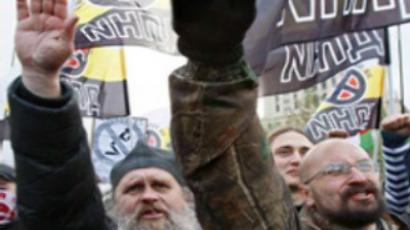Neo-Nazi internet video scrutinised
Russian authorities are checking the authenticity of a neo-Nazi internet video, which appears to show a brutal double murder of a Tajik and a Dagestani by Russian neo-Nazis. One man is in custody for allegedly circulating the material.
Police in the Southern Russian Republic of Adygeya have detained a man suspected of distributing the film.
It's still not known if the video material is authentic and who's behind it.
Scenes of the beheading of two men from Tajikistan and Dagestan circulated the web for 18 hours.
A 24-year-old student in the southern Russia town of Maikop has come forward and admitted he posted a video of execution in an email. It would have been nothing out of the ordinary if the youth had not done so intentionally.
A member of a local Slavic Union, he also admitted supporting nationalist-socialist ideas and distributing similar materials online for the past two years.
“There's a person who came to us and made a statement saying that on August 13, he posted on the Internet some information he received by e-mail. We are in the process of verifying this,” Vasily Guk, Senior Assistant Prosecutor, Republic of Adygeya said.
This is not the first time that Russian neo Nazis have posted videos of hate crimes online. Violence, staged or real, is all over ultranationalist websites. But this is the first time that execution style killings, have been seen.
Two men are shown on their knees under a swastika. One is beheaded, one is shot. All in 2 and a half minutes of video. It is too brutal. But that is not the only reason RT decided not to show the controversial footage. Under Russian law it is illegal to broadcast anything intended to promote violence.
And posting it online is a crime. The distributor may end up in prison for 2 years.
Russian neo-Nazsi, even if they know how to use special effects they are unable to fabricate a minute long scene of beheading. Some things may have been edited, but I'm convinced the killings happened,
Aleksandr Verhovsky, SOVA Analytical Centre
The video is attributed to the Nationalist-Socialist party of Russia, a never-heard-of organization. A registered group with a similar name has denied any involvement.
They share the ideology, but there is not likely to be other links between the makers of the video and its distributors. Untangling the web may be tricky for investigators, but the video's impact was there for everyone to see. The so-called executions topped Russian blog sites and search engines in popularity, before being pulled from site.
Michel Wieviorka, a French sociologist and expert on extremism, says racism and anti-semitism are born during times of institutional crisis.
“You can have racism without immigrants. After all you could say racism in France is to an extent rooted in colonialism, the opposite of immigration. You can have anti-Semitism in places where there are no Jews. There are some countries in central Europe where there wasn't a single Jew after WW2 and over the next 20, 30, 40 years there was lots of anti-Semitism. In Poland at the moment anti-Semitism is on the rise, even though there are hardly any Jews. You need social measures because extremism is born in times of social crisis. You need institutional measures. Racism and anti-Semitism are born during times of institutional crisis. And you need to think about cultural identity. What do you do with minority groups? How should you treat them? Speak to them!”













